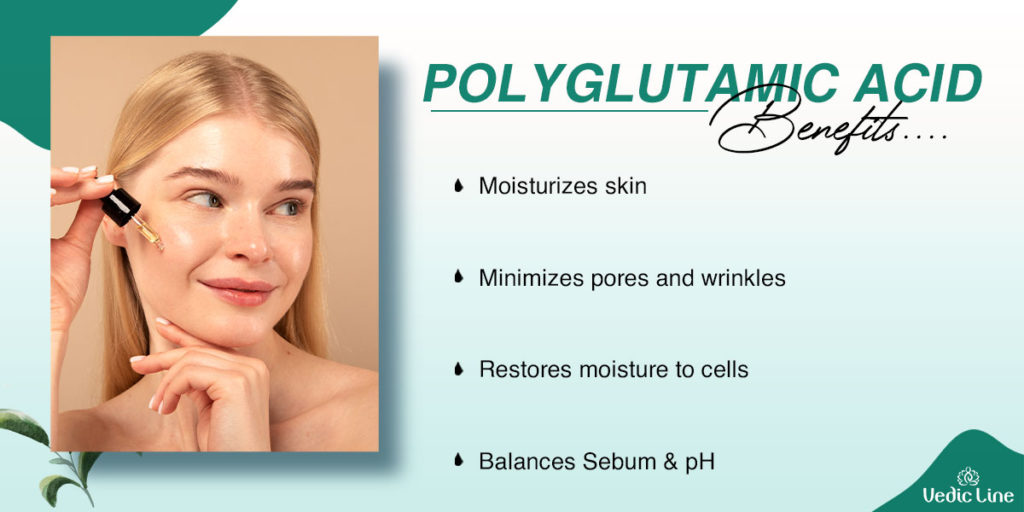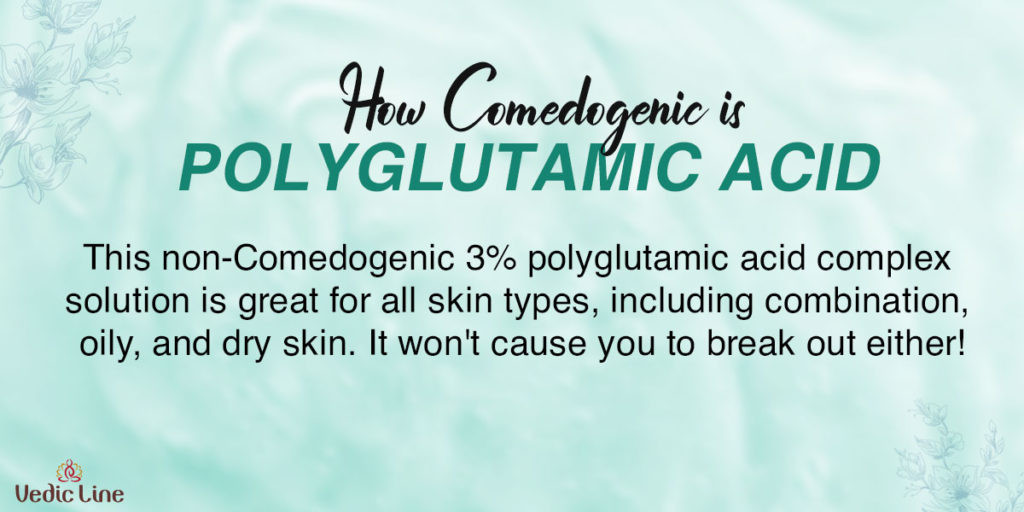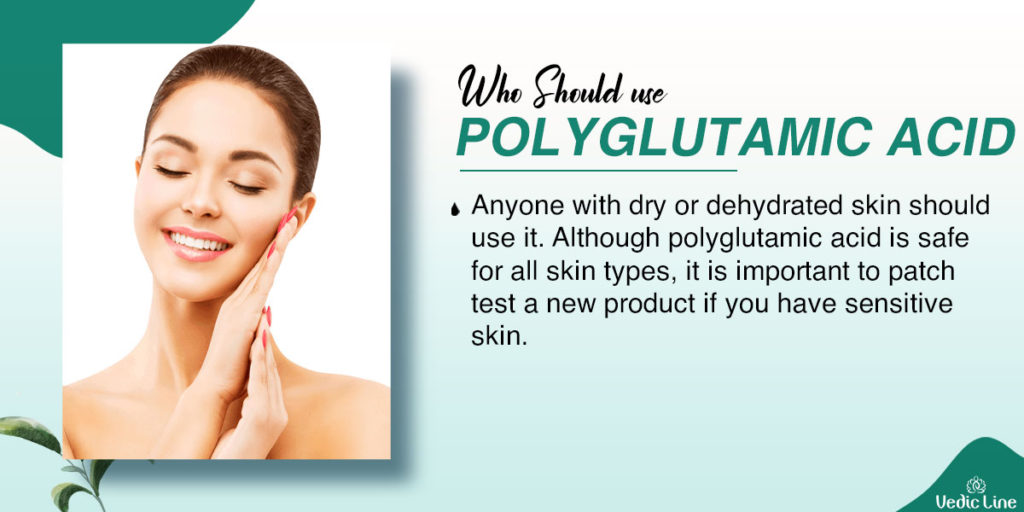Polyglutamic Acid – A Star Ingredient For Your Skincare Regime

All of us desire to care for our skin with cutting-edge cosmetics made with top-notch ingredients. There is a lot to keep up with in terms of skincare research, which is continuing. These days, polyglutamic acid is a popular ingredient that is getting increasing attention. The polypeptide in question has been known for a while, but only recently has there been a lot of discussion around it. According to research, it has several skincare advantages and characteristics that are similar to those of glycerine and hyaluronic acid. However, is it superior to hyaluronic acid? Do you need to include it in your skincare regimen? Let’s explore the perks of polyglutamic acid for skin routines in more detail.
Let’s Know what is polyglutamic acid
PGA, also known as polyglutamic acid, is a polypeptide that naturally exists in our bodies. Proteins called polypeptides are composed of many chains of amino acids. In addition to the PGA that our bodies naturally manufacture, polyglutamic acid for skin is created by a bacteria that results from fermented soybeans. Although fermented substances are popular in skincare, this is just a result of the fermentation process and not an actual component.
In the realm of skincare, it’s not only a substance that has advantages. Other advantages of PGA include its capacity for drug administration and wound healing. It is a flexible, non-toxic material that is the subject of ongoing research in a number of fields.
-
 Buy Vitamin C Facial Kit & Get 3 Japanese Cherry Blossom Facial Kit (Mono Dose)₹2,500.00
Buy Vitamin C Facial Kit & Get 3 Japanese Cherry Blossom Facial Kit (Mono Dose)₹2,500.00 -
Product on sale
 Vitamin C Day Cream With Hyaluronic Acid & Aloe Vera ExtractOriginal price was: ₹600.00.₹480.00Current price is: ₹480.00.
Vitamin C Day Cream With Hyaluronic Acid & Aloe Vera ExtractOriginal price was: ₹600.00.₹480.00Current price is: ₹480.00. -
Product on sale
 Vitamin C SerumOriginal price was: ₹900.00.₹630.00Current price is: ₹630.00.
Vitamin C SerumOriginal price was: ₹900.00.₹630.00Current price is: ₹630.00.
Benefits for skin

When it comes to maintaining hydration, polyglutamic acid excels. A stronger humectant than hyaluronic acid, this material can hold 5000 times its weight in water. It can draw in more moisture than hyaluronic acid can. Our skin becomes more elastic as it becomes more moisturized. Because it keeps our skin smooth and plump, PGA is a great anti-aging ingredient.
The potential of polyglutamic acid to prevent our bodies from metabolizing their own hyaluronic acid is another intriguing skin benefit that is emerging from studies. Due to its capacity to hold onto moisture, PGA is also beneficial for wound healing and has long been utilized in adhesives.
Even better, this helpful component blends easily with other ingredients to maximize hydration. Polyglutamic acid for skin treatments increase patients’: when used in conjunction with peptides or HA, for example.
- skincare hydration
- apparent pores
- Skin thickness
- elasticity of skin
- skin barrier action
PGA and Types of Skin
For moisturizing all skin types, PGA is a kind ingredient. It’s suitable for persons with impaired skin because it works in quantities as low as 0.1%. However, PGA might be more useful than HA for people with sensitive or excessively dry skin. Wintertime, when the cold weather chaps skin even more, is a time when this is especially true.

A Home Hydration Superhero Is PGA
To keep your skin hydrated and moisturized, use PGA two times each day. Layer it into your routine in the morning as follows:
- With PGA Spot treatments, use the cleanse serum.
- lotion for the eyes
- Sunscreen
During the evening:
- Exfoliate and spot treat after cleaning
- Retinol- and PGA-containing eye serum
How to Include Polyglutamic Acid in Your Skincare Routine
There are few negative side effects when polyglutamic acid for face is administered twice daily. It works best as the final step in a thorough skincare regimen because it stays on the surface of our skin. By forming a film on the surface of our skin, the PGA functions as a seal. A sunscreen application should always be the last step in any skincare regimen. A new product or component should always be tested on a small patch of skin before use if the user has sensitive skin.
-
Product on sale
 Active Charcoal FacialOriginal price was: ₹2,000.00.₹1,600.00Current price is: ₹1,600.00.
Active Charcoal FacialOriginal price was: ₹2,000.00.₹1,600.00Current price is: ₹1,600.00. -
Product on sale
 Active Charcoal Disinfecting Face Wash₹160.00 – ₹575.00
Active Charcoal Disinfecting Face Wash₹160.00 – ₹575.00
Hyaluronic acid Vs Polyglutamic Acid
The body naturally produces hyaluronic acid (HA), which is most abundant in the skin, joints, eye sockets, and other tissues. Similar to PGA, it enhances skin texture and is utilized in beauty serums.
Although we naturally produce it, its production decreases with aging because the enzyme hyaluronidase breaks it down. The two can be used together and may even work better together because PGA is known to inhibit this enzyme.
Rather than by the body, a collection of amino acids and healthy microorganisms produce PGA. Due to its higher molecular size than HA, polyglutamic acid can draw in and seal in more water. Cosmetic experts point out that PGA, despite not being as well-known as HA, is far more moisturizing.
You will probably notice more hyaluronic acid products on sale because PGA is more expensive than HA and it is a relatively recent addition to the skin care industry.
Uses Polyglutamic Acid

1. There are several different types of polyglutamic acid. Use topical polyglutamic acid to keep your skin moisturized. There are medical applications for oral polyglutamic acid supplements that are unrelated to skin care.
2. Polyglutamic acid serum,To help keep your skin hydrated, you can apply a polyglutamic acid serum or other moisturizing serums to your face up to twice daily.
3. Creams, gels, or lotions containing polyglutamic acid. Many businesses offer lotions and other topical medications containing polyglutamic to treat the skin on your face or the area around your eyes. Frequently, polyglutamic acid is coupled with other anti-aging agents.
4. Supplement with polyglutamic acid. Although polyglutamic acid is available as a supplement, it is unlikely to benefit your skin’s health.
Last Thoughts
When applied to your skin, polyglutamic acid for skin functions as a humectant. Humectants are chemicals that attract moisture into your skin from the surrounding air.
Similar to AHAs or glycerine, polyglutamic acid is a humectant found in cosmetic products. You can use polyglutamic acid on its own or in combination with other compounds, such as hyaluronic acid, that slow down the signs of aging.
